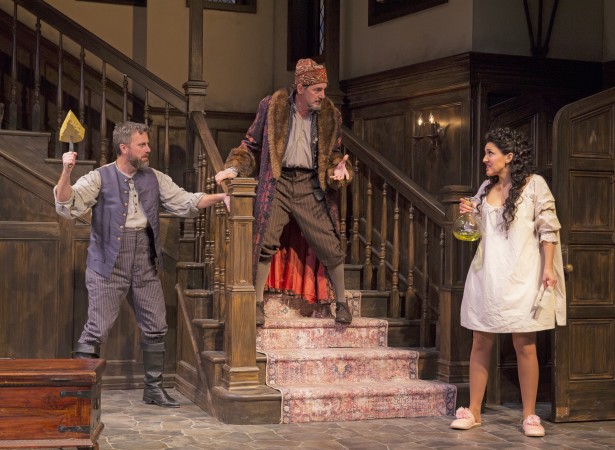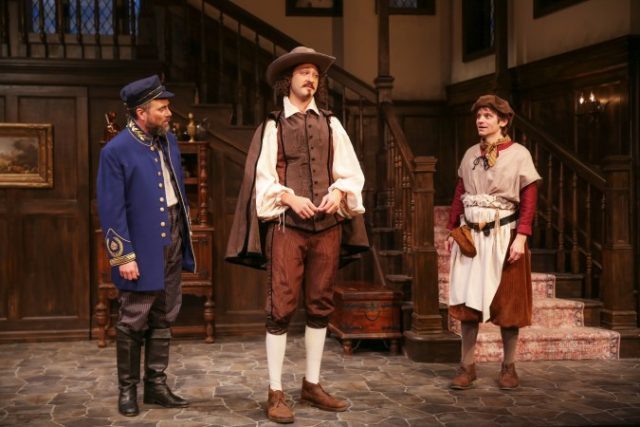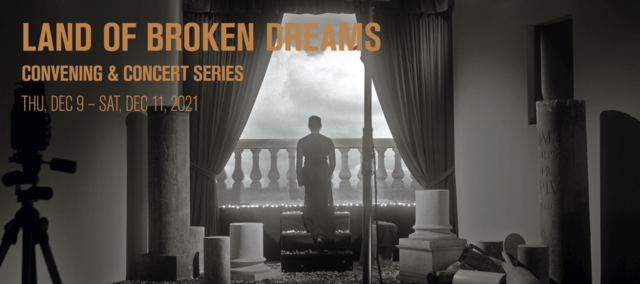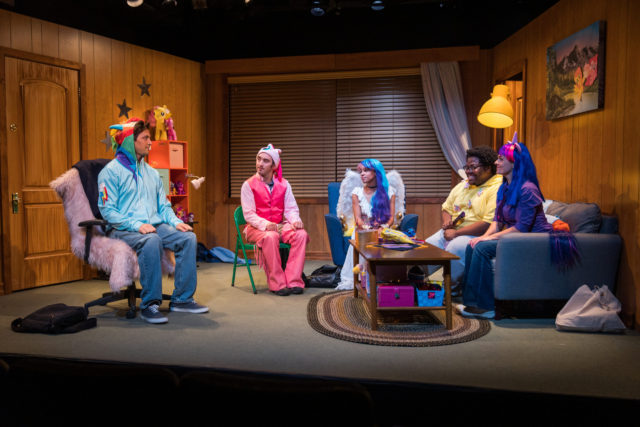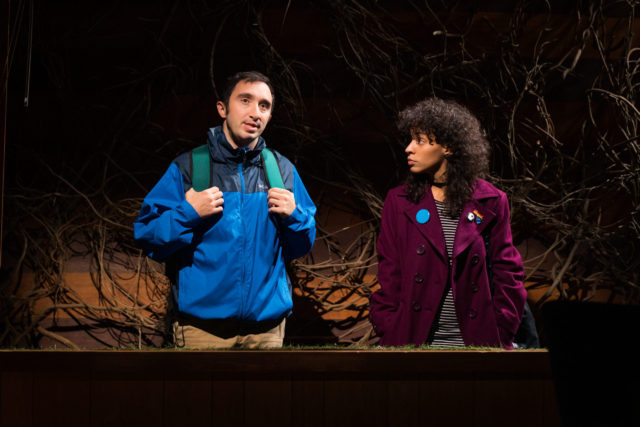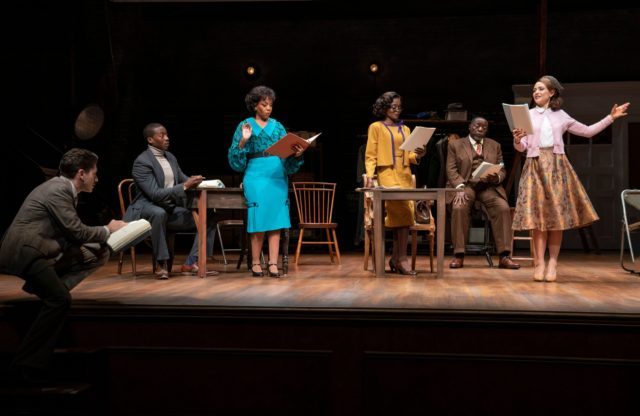
Alice Childress’s Trouble in Mind finally makes it to Broadway after sixty-six years (photo by Joan Marcus)
TROUBLE IN MIND
American Airlines Theatre
227 West 42nd St. between Broadway & Eighth Ave.
Tuesday – Sunday through January 9, $39-$250
212-719-1300
www.roundabouttheatre.org
In 1955, Alice Childress’s Trouble in Mind was destined to be the first play by a Black woman writer to be staged on Broadway. However, when the white producers insisted that Childress use a rewritten happy ending instead of her original one, she adamantly refused. Four years later, Lorraine Hansberry’s A Raisin in the Sun opened at the Ethel Barrymore Theatre and became a much-revived classic while Trouble in Mind languished in relative obscurity, occasionally performed by small companies and schools.
The play has finally made its Broadway debut, in an uneven Roundabout production at the American Airlines Theatre. Right before it begins, an announcement explains that it is being presented exactly as Childress wrote it, without one word being changed. In the hands of director Charles Randolph-Wright, that might not have been the best idea, as this Trouble in Mind, which can be laugh-out-loud funny and sharply poignant and prescient, too often feels stilted and repetitive as Childress reveals the systemic racism and misogyny baked into the theater, which is still all too relevant today.
It’s the fall of 1957, and a group of actors are arriving at a Broadway theater to start rehearsals for Chaos in Belleville, a play by an unseen white man named Melton about racism, sharecropping, and lynching. The cast consists of the bitter Wiletta Mayer (LaChanze), a middle-aged Black actress who has grown sick and tired of playing mammies, maids, and slaves; Millie Davis (Jessica Frances Dukes), a younger Black actress who loves fancy outfits and likes to sting Wiletta about her advanced age; Sheldon Forrester (Chuck Cooper), an elderly Black character actor who usually doesn’t stir the pot but is concerned about certain aspects of Chaos; John Nevins (Brandon Micheal Hall), a young Black actor with dreams of success; Judy Sears (Danielle Campbell), a white Yale woke grad; and Bill O’Wray (Don Stephenson), an established white actor who declines to have lunch with his Black colleagues. Al Manners (Michael Zegen) is the white director who is so determined to have a hit that he fails to understand the inherent racism of the script and the needs of his cast; Eddie Fenton (Alex Mickiewicz) is the white stage manager and Manners’s right-hand man, and Henry (Simon Jones) is an elderly white doorman who has seen it all.
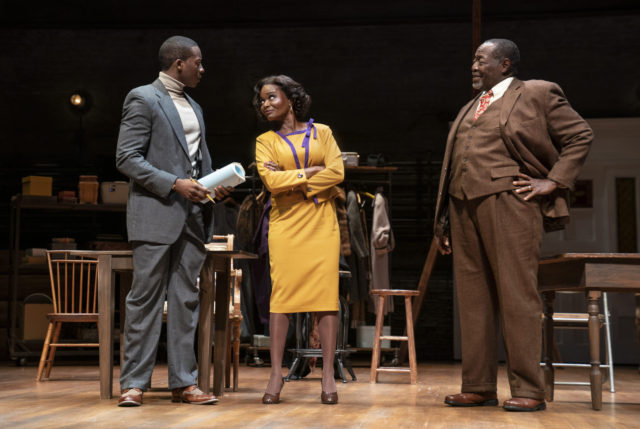
Wiletta (LaChanze) teaches John (Brandon Micheal Hall) a thing or two about the business as Sheldon (Chuck Cooper) looks on (photo by Joan Marcus)
“I think the theater is the grandest place in the world, and I plan to go right to the top,” John tells Wiletta, who tries to set him straight. “Show business, it’s just a business. Colored folks ain’t in no theater,” she says, explaining how he should act in front of white people, pretending to laugh at their jokes. “White folks can’t stand unhappy Negroes . . . so laugh, laugh when it ain’t funny at all,” she strongly advises.
John and Millie believe Chaos is an important work. “I hope I can do a good job and that people learn something from this play,” Millie says naively. Sheldon just hopes that everything goes smoothly, regardless of the content of the play. “Do, Lord, let’s keep the peace,” he says. “Last thing I was in, the folks fought and argued so, the man said he’d never do a colored show again . . . and he didn’t!”
Manners claims he is seeking authenticity, espousing, “I want truth. What is truth? Truth is simply whatever you can bring yourself to believe, that is all.” But his idea of truth is more about financial success than the inherent racism in the play, which starts to come out as some of the actors can’t hold back their thoughts any longer, including Judy, who shouts, “Oh, I get so mad about this prejudice nonsense! It’s a wonder colored people don’t go out and kill somebody, I mean actually, really do it . . . bloody murder, you know?”
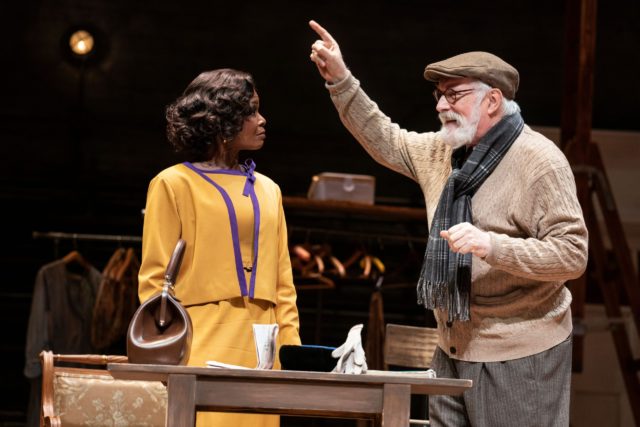
Henry (Simon Jones) makes a point to Wiletta (LaChanze) in Trouble in Mind (photo by Joan Marcus)
Childress, who grew up in Charleston and Harlem and wrote such other plays as Florence and Wedding Band: A Love/Hate Story in Black and White (being revived in the spring by TFANA) in addition to the young adult novels A Hero Ain’t Nothin’ but a Sandwich and the Pulitzer Prize-nominated A Short Walk, cuts to the heart of racism in theater in Trouble in Mind; she was inspired to write it after appearing with Georgia Burke in the 1944 Broadway show Anna Lucasta, basing the character of Wiletta on Burke. She also references the idea of being forced to make script changes. “Melton is so stubborn, won’t change a line,” Eddie tells Manners, who replies “But he did.” Eddie adds, “Yes, but so stubborn.” Manners concludes, “A genius should be stubborn.”
Tony winner LaChanze (The Color Purple, The Secret Life of Bees) is radiant as Wiletta, who is bold and strong, caught in between wanting to continue her career but no longer able to hold back what she thinks. (As a bonus, LaChanze gets to belt out a song too.) In her Broadway debut, Dukes (Is God Is; By the Way, Meet Vera Stark) excels as Wiletta’s nemesis, each costume (by Emilio Sosa) making statements of their own.
Zegen (Bad Jews, Bob & Carol & Ted & Alice) overplays his hand as Manners, while Tony winner Cooper (The Life, Avenue X) is cooped up by Randolph-Wright’s (Motown the Musical, Ruined) often stagnant direction, not making enough use of Arnulfo Maldonado’s long, deep set. At one point Manners says, “I definitely know what I want and however unorthodox my methods, I promise never to bore you.” Unfortunately, that’s just what happens, especially in the second act. It’s as if Randolph-Wright has such reverence for Childress’s stand to make no revisions that he lets the pace drag as every word she wrote is delivered with the same emphasis, leaving the production feeling more like a historical document than the gripping drama it should be.


